
Amidst the diverse landscape of educational opportunities, students from various backgrounds confront an array of challenges that shape their aspirations and paths forward, from financial uncertainties to societal expectations. How does the Equitable Education Fund (EEF) in Thailand, an organization responsible for dismantling barriers to learning through research, collaboration, and support for children, youth, and adults in need, address these challenges, paving the way for students to navigate their educational journey into higher education with confidence and resilience? Specifically, how have the insights gleaned from surveyed students, teachers, and school administrators informed the recent amendments to the funding of the EEF’s Equity Fund scholarships, as well as the implication of its overarching Education Security System?
Navigating the journey of higher education presents students with a multitude of challenges to overcome. Some seek guidance to weigh the benefits of continuing their studies, emphasizing the crucial role mentors play in clarifying future prospects and aiding them in overcoming obstacles. The main challenge for these students here lies not only in financial constraints but also in a lack of awareness about available opportunities, resulting in uncertainty about their future paths. Engaging with the EEF’s interactive activities empowers them to envision their academic and career trajectory with increased confidence. Despite concerns about expenses, consistent financial support from Equity Fund scholarships has alleviated their worries, bolstering their dedication to education.
Meanwhile, other students ponder the financial implications of further education, questioning whether the investment will yield viable career prospects post-graduation. Despite the invaluable support provided by the EEF’s Equity Fund scholarships, concerns about loan repayment and limited job prospects persist. Reflecting on these adversities not only underscores the inherent risks in pursuing further education but also highlights the immense potential for personal and professional growth. Only through this resilience and determination can students navigate their educational journey, emerging stronger and more prepared to seize opportunities for advancement and fulfillment in their chosen fields.
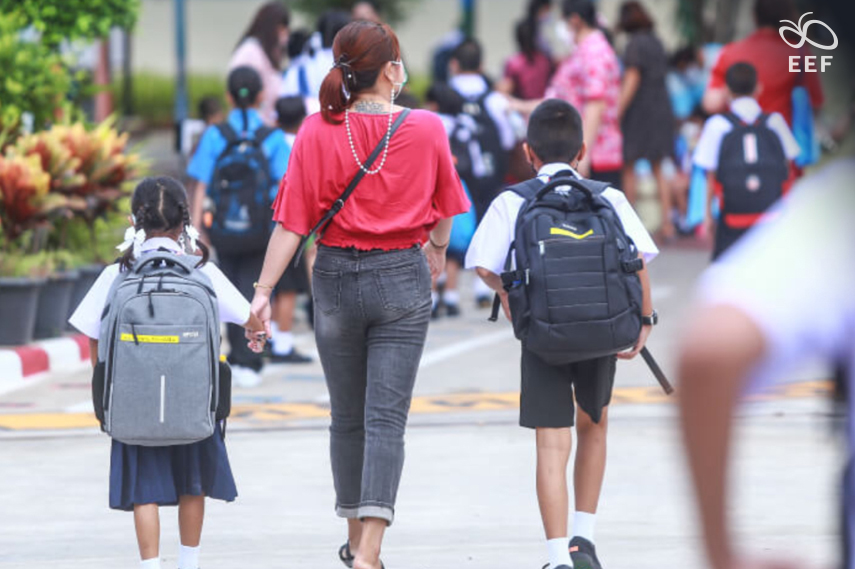
Grade 9 marks a crucial juncture for students as they grapple with shaping their futures amidst the challenges of limited information and financial constraints. Recognizing the significance of this pivotal moment, educators emphasize the dual approach of self-discovery and financial assistance. They advocate for immersive activities provided by the EEF Thailand that mirror real-life contexts, coupled with tailored support, to empower students in understanding their potential and career aspirations. While Equity Fund scholarships offer essential backing, the transition to higher grades more often than not demands other additional financial resources, leading students to explore diverse pathways, including the consideration of student loans. Clarity in educational and career objectives becomes imperative for students to navigate their academic journey with resilience and purpose.
Concurrently, schools play a pivotal role in facilitating post-compulsory education pathways by prioritizing the comprehensive collection of student data. By doing so, they are enabled to provide personalized assistance, minimize dropout rates, and ensure equitable opportunities for all learners. Moreover, administrators collaborate closely with universities to inspire students to explore a spectrum of academic and career options, guiding them toward vocational training or community college pathways. Additionally, they advocate for platforms offering robust career guidance and skill development initiatives. All this is to broaden students’ horizons and instill the belief that education is a gateway to boundless opportunities for growth and fulfillment.
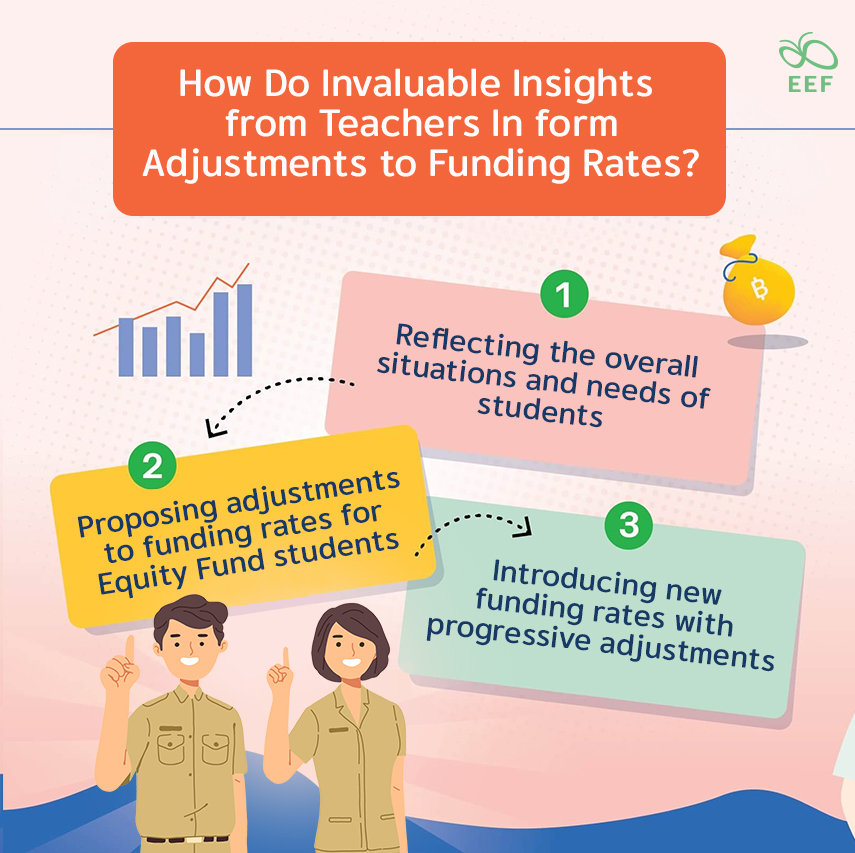
All the aforementioned findings have been further corroborated with the recent research conducted by the EEF, where it has been observed that students from economically disadvantaged backgrounds face significant challenges in pursuing education beyond compulsory schooling, with a mere fraction continuing their studies compared to their more financially stable peers. Financial constraints, including tuition fees, school supplies, and living expenses, pose major obstacles to their educational aspirations, often leading to a juggling act between education and employment. To address these challenges, initiatives like the Conditional Cash Transfer (CCT) project provide financial aid contingent upon educational achievements, aiming to prevent dropouts and support disadvantaged students. Collaborative efforts between public agencies and educational institutions have facilitated the distribution of funds based on the Proxy Means Test (PMT), ensuring equitable access to higher education opportunities.
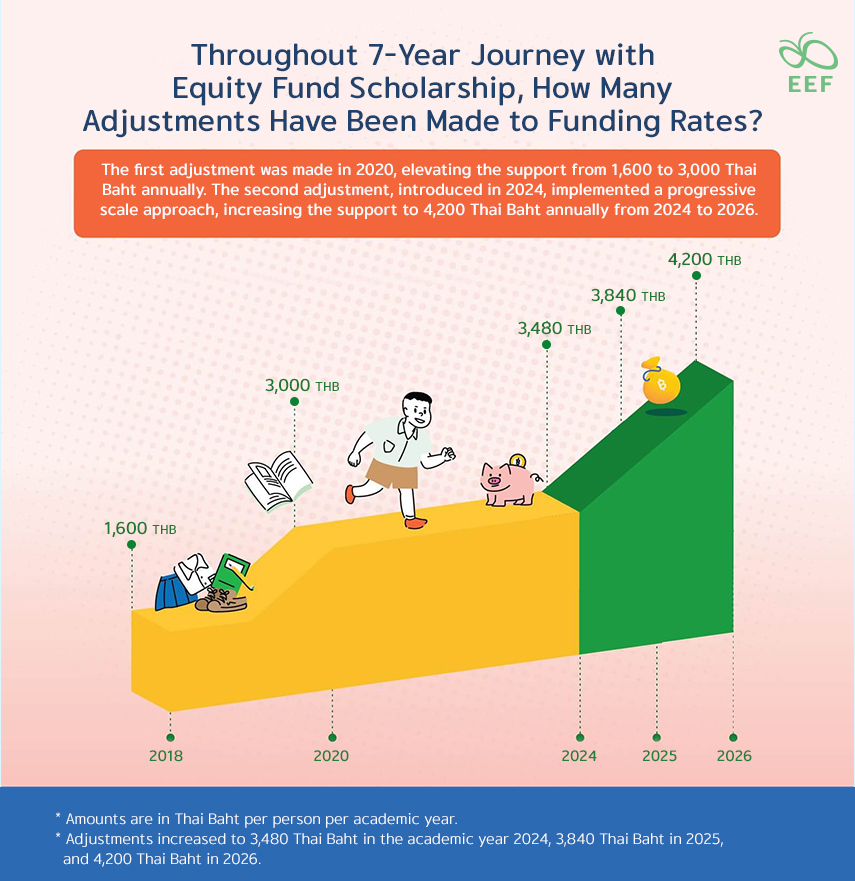
Throughout the 7-Year Journey with Equity Fund Scholarship, How Many Adjustments Have Been Made to Funding Rates?
The first adjustment was made in 2020, elevating the support from 1,600 to 3,000 Thai Baht annually. The second adjustment, introduced in 2024, implemented a progressive scale approach, increasing the support to 4,200 Thai Baht annually from 2024 to 2026.
*Amounts are in Thai Baht per person per academic year.
*Adjustments increased to 3,480 Thai Baht in the academic year 2024, 3,840 Thai Baht in 2025, and 4,200 Thai Baht in 2026.
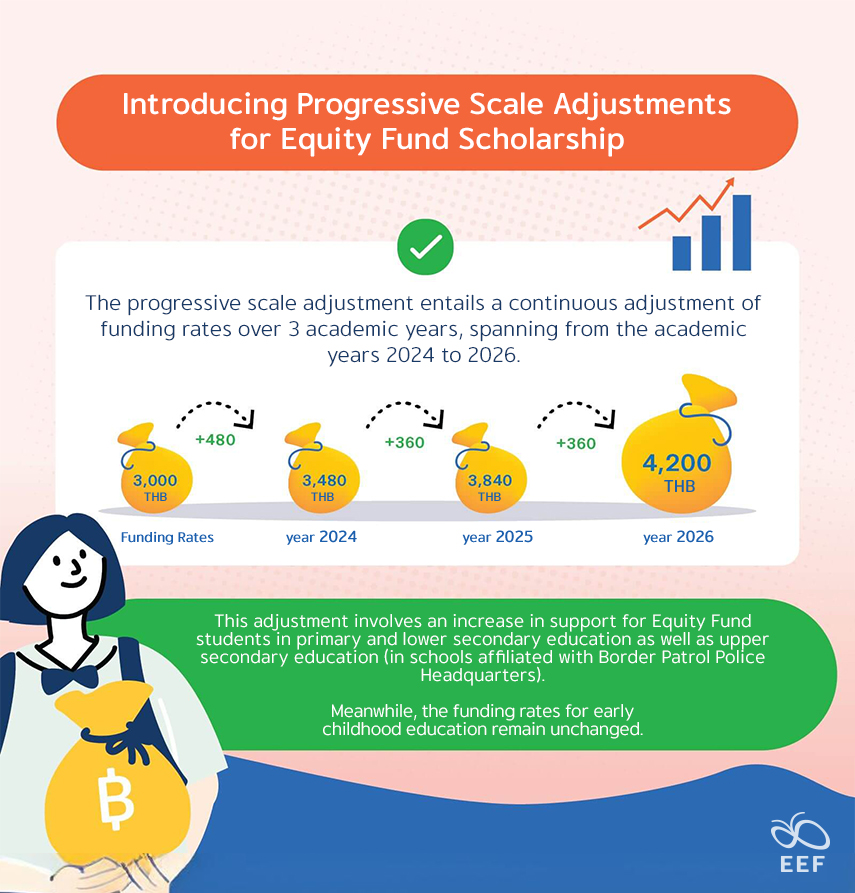
Introducing Progressive Scale Adjustments for Equity Fund Scholarship
The progressive scale adjustment entails a continuous adjustment of funding rates over 3 academic years, spanning from the academic years 2024 to 2026.
This adjustment involves an increase in support for Equity Fund students in primary and lower secondary education as well as upper secondary education (in schools affiliated with Border Patrol Police Headquarters).
Meanwhile, the funding rates for early childhood education remain unchanged.
In collaboration with these efforts, adjustments to the funding rates within the Equity Fund scholarship initiative have been made over the past seven years. Beginning with an elevation of support in 2020 to 3,000 Thai Baht per person annually, a subsequent adjustment in 2024 introduced a progressive scale approach, increasing support to 4,200 Thai Baht annually from 2024 to 2026. These adjustments aim to align financial aid with the evolving needs of Equity Fund recipients, ensuring uninterrupted access to education conducive to holistic age-appropriate development. Furthermore, recognizing the importance of student and teacher feedback, these adjustments, particularly the introduction of the progressive scale, represent significant strides towards tailored support for Equity Fund students. They serve as a beacon of hope, signaling a commitment to addressing the challenges faced by economically disadvantaged students and fostering a brighter educational journey for all.
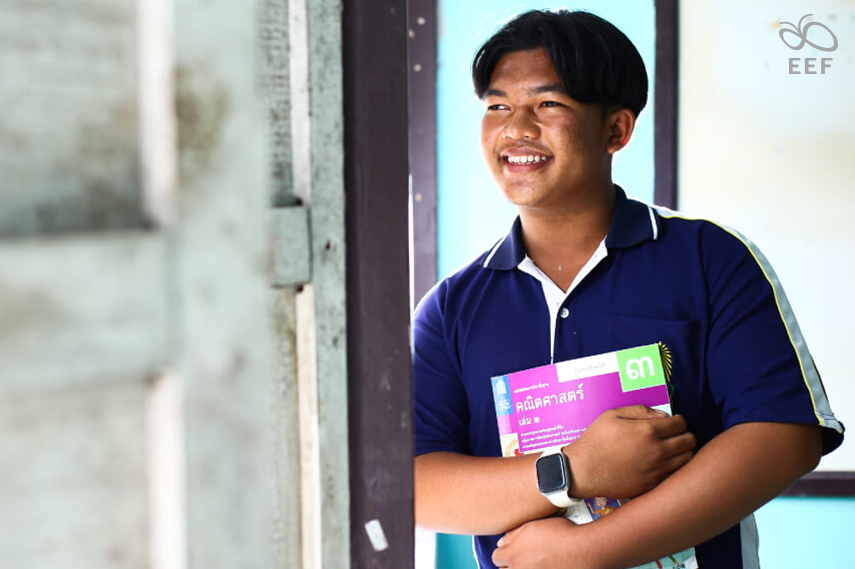
The journey of higher education is fraught with challenges, from financial constraints to uncertainties about the future. However, through the concerted efforts of organizations like the Equitable Education Fund (EEF) Thailand and the dedication of educators and administrators, students are empowered to navigate these obstacles with confidence, resilience, determination, and purpose. By providing financial support, personalized assistance, and growth opportunities, the EEF and educational institutions ensure that all students have access to the tools they need to succeed. Ongoing research and adjustments to funding initiatives reflect a commitment to addressing the evolving needs of students and fostering a more inclusive educational landscape. Insights gleaned from students, teachers, and administrators inform the development of the EEF’s Education Security System, ensuring initiatives like the Equity Fund scholarships are responsive to student needs. Through these efforts, the EEF is committed to fostering an equitable educational environment where every individual can thrive and realize their potential.

